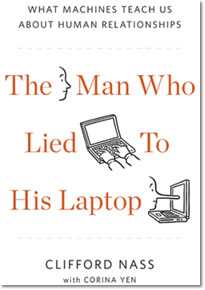
Java Creator James Gosling explained why he quit Oracle in an interesting interview on eWeek. It is clear he had no understanding about what happens in an acquisition, particularly for an old school open source unit that has been the exact opposite of a profit center.
I’ve been part of a lot of mergers over the years, and we are now in a buyers’ market for companies, suggesting that many of you will go through one of these too and may want, and need, a better grasp of what is coming than Gosling clearly had. I’ll explore being on the wrong side of an acquisition this week.
I’ll close with my product of the week, a book called The Man Who Lied to His Laptop, which does the best job I’ve seen of explaining why women don’t do well as executives, why most managers suck at giving criticism, and what most parents should learn about motivating their kids. The guy who wrote this is one of the leading sociologists and specialists in man/computer interfaces in the world, which is what makes this book truly interesting.
Gosling’s Complaint
What Gosling complained about was that post acquisition, instead of having the stature that he was used to at Sun, he was micro-managed. Oracle came in and changed his job to one of being simply a talking head for Java.
He was actually very lucky to get that much, but he seems to think that it is Oracle at fault and simply doesn’t realize that this experience would have likely been equivalent had he been acquired by any of the other profit-oriented companies. It is profit orientation that positions a company on the buy rather than the sell side — or in Sun’s case, the fire sale side.
Power Balance
When a company is acquired, it gives up control. The executives from the acquiring firm have more power than the executives of the firm acquired, and these new executives in power have no understanding — nor do they generally care that much — of things like historical practices, pre-existing power structures or the culture of the firm.
If they had actually wanted to be in the acquired firm, they likely would have left where they were some time earlier. They likely ended up in their new jobs as a result either of not being very astute politically or being seen as redundant where they were. This means they suddenly went from positions of low status to relatively high status, and they have a deep desire to flex their new muscles. They generally don’t want advice and will feel that any questioning of their orders is a challenge to their newfound power, and they will respond badly.
Cost Centers vs. Profit Centers
If there is power that exists in the acquired company, it is with the units that are contributing to the bottom line. Cost centers get the most oversight and the deepest cuts, common cost-oriented services like HR, marketing, and operations may simply be eliminated in favor of the new parent company’s units. Java likely was a big cost center — and this applies to many open source efforts where the software is free and the cash generated comes from related service offerings. It makes the services team the revenue center and the open source effort a cost center.
Oracle is a very successful company financially, and Larry Ellison is not a huge fan of free anything, open source or not, and the end result is the firm views an effort like Java as a problem to be fixed. That problem is cost with a lack of significant matching profits, which goes to the core of why Oracle filed suit against Google over Java. It is seeing if it can be mined.
Valued vs. Unvalued Employees
If you are in a cost center, you are at risk — but another way of making that determination is whether the acquiring company put you under a retention package. Firms analyze their employee risk, and they put any resource they want to retain under a retention package that provides strong financial benefits for staying and removes them upon leaving prematurely.
It is kind of amazing how many valued employees leave after their retention packages expire — but if you don’t get one of these packages, you are on a list of folks the company can do without and are likely either to be laid off or put under increasing pressure to quit.
Sometimes firms are simply bought for their brands and intellectual property. In this case, no one gets a retention package, and the unshared plan is to eliminate much of the acquired firm’s additive headcount once the critical skills have transitioned to the acquiring firm’s staff. However, the rule here is that you don’t get a retention package plan because the acquiring firm has determined that you have no unique value it needs.
Stupid Acquisition Plan
As I write this, I’m sitting in a session at Nvidia’s Emerging Companies Summit with a panel of venture capitalists (VCs) and investment bankers talking about new companies looking for funding, and best practices for getting it (likely information that alone would make this conference worth attending).
One of the things they are talking about is how many companies are being formed with the endgame of being acquired by a firm like Oracle, Cisco or Google. They aren’t very positive about these strategies, because if you miss the window — and there may be three or more companies doing this in a given area — you lose the bankers’ money, not to mention waste the time and contributions of their employees. They advise that it is better to have a real business plan then one that looks more like a risky designed-in early retirement strategy for the top executives.
Survival Strategy
Clearly, avoid companies whose long-term strategy is to get acquired, unless you get enough stock or options to make you comfortable being unemployed after the planned acquisition. If you are acquired, and particularly if you don’t get a retention package as a result of the acquisition, you should migrate from a cost center to a profit center as quickly as possible, or transfer to the acquiring company, or get your resume in order and start aggressively looking for something else, or expect to be really disappointed by what results.
Often, there are opportunities to volunteer for transition teams, which can allow insight into jobs in the acquiring company or to better position yourself as a critical resource. Don’t expect things not to change, though, and do make an honest assessment of how valuable you are and whether you’re likely to be cut in the coming big downsizing. Acquired companies generally get cut a lot. They may call it “aggressive performance management” or a “re-org” or “outsourcing,” but the result is the same: The acquired company is going to get much smaller.
Wrapping Up: Play Heads-Up Ball
If you are acquired or in a unit that has become suddenly redundant as a result of an acquisition, you are at risk. There is a tendency to listen to management rhetoric and believe what these executives say, but that strategy isn’t a good one. Neither is standing up and being the person who is outspoken about how clueless the acquiring company is.
Concentrate on moving yourself into a position of safety — and if you do stand out, stand out as an employee who solves problems rather than being one. Oh, and for those using Java, Oracle is going to try to turn it into a profit center, and I would anticipate this direction for any “free” open source offering, because “free as in free beer” clearly isn’t paying the bills.
Product of the Week: The Man Who Lied to His Laptop
 Have you ever wondered why women are often not taken seriously, or it seems like the biggest jerks you know get promoted over better managers? Do you want to know how to be more successful in your dealings with women, your children, your employees or your managers?
Have you ever wondered why women are often not taken seriously, or it seems like the biggest jerks you know get promoted over better managers? Do you want to know how to be more successful in your dealings with women, your children, your employees or your managers?

Want to understand why BMW had to recall its German GPS systems and replace the male voice with a female one? How about why Clippy, the hated Microsoft Word character, was killed after it was fixed?
Answers to these questions and more are in the book The Man Who Lied to his Laptop by top sociologist and computer man/machine interface expert Clifford Nass of Stanford. Based on massive amounts of real research, which is rare in this Internet age, this book can help you be much more successful in dealing with a variety of people.
This is because it teaches the why behind our good and bad interactions with people through analysis that was done with machines. (It’s kind of scary to consider that machines may be better at dealing with people than people are in a few short years.)
Because The Man Who Lied To His Laptop makes us into more successful humans, it is a natural for my product of the week. I think this should be on the shortlist of books to read for any manager or parent. It offers seriously good insights, and we don’t get enough of that.
Rob Enderle is a TechNewsWorld columnist and the principal analyst for the Enderle Group, a consultancy that focuses on personal technology products and trends.






















































Open source software improves scalability & performance and is easy to access . We at Lucid offer a broad portfolio for all Lucene / Solr applications and provide tech support as well. You can get all the information at or To know more check : http://www.lucidimagination.com/